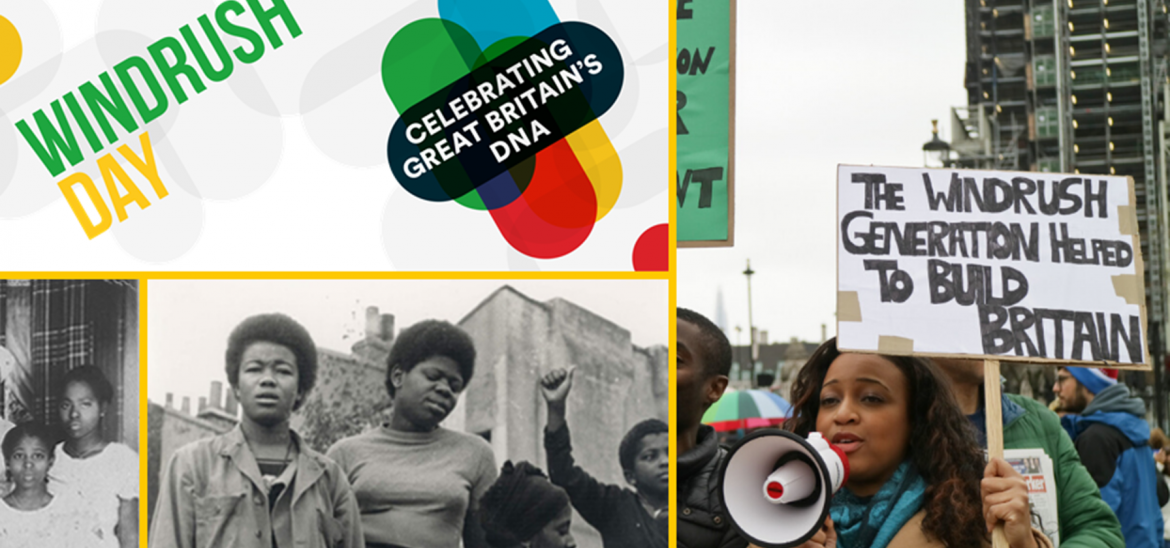Into Film Clubs
Find out everything you need to know about starting an Into Film Club.



It's almost Windrush Day (22 June) and with protests currently taking place across the world - addressing both longstanding inequalities faced by Black people and the need to approach our histories in more genuinely reflective ways - it is more vital than ever that we remember the Windrush generation, their tremendous contribution to British life and the recent scandal that devastated so many of their lives.
As such, we've collected together a variety of material that can help you engage young people with such a fundamental part of British history. Read on for a brief overview of the subject, resources from organisations such as the Black Cultural Archives and TES, information on the brilliant new BBC TV film Sitting in Limbo and some exciting ways that you can get involved.
The first Windrush Day in 2018 marked 70 years since the MV Empire Windrush arrived in London with the first wave of Caribbean migrants, coming to help rebuild Britain after World War II and find greater opportunities for themselves. Those who arrived from this point up until 1973 - when a 1971 Immigration Act officially came into force - would come to be known as the Windrush generation.
The below statement of solidarity from the Black Cultural Archives provides further context to the generation's place in British history:
"The tens of thousands of people who travelled as British citizens between 1948 and 1973 were invited to this country to help rebuild post-war Britain. The elders of Britain's Caribbean heritage community were a pioneering generation who laid solid foundations that rebuilt post-war Britain.
This is not an immigration story, not a moment of migrant history, but is central to British history. The history of Black people in Britain dates back centuries, yet this history has been long hidden. It is our duty to unearth and share these histories with everyone for a better and deeper appreciation of Britain. This will ensure injustices borne of ignorance and lack of empathy do not continue to occur and debate the value we give to this society. The "Windrush generation" came on their own and then brought their families here. The resilience and courage of the generations that followed them have shaped today's Black British community. The fact that citizenship questions are being raised decades later is highly problematic."
The Black Cultural Archives' resources are also essential starting points for a detailed history of the Windrush generation. Their subject guide, War to Windrush covers ground from World War I to the end of the Windrush period, and includes both a timeline of events and a detailed list of further sources. For any younger learners, the British Library features creative writing activities for primary students.
If you want to delve even deeper, TES houses a vast range of resources for Key Stage 3 (or equivalent) and the National Archives has created a Voices of the Windrush Generation collection, which features first hand accounts from men, women and children.
It is equally important to properly understand the 2018 Windrush Scandal, which wrongly detained around 850 people between 2012 and 2017, and led to the deporting of at least 83 members of the Windrush generation. Head to the The Joint Council for the Welfare of Immigrants for a useful summary and make sure to watch the extremely powerful recent BBC TV film, Sitting in Limbo, which follows the real life story of Anthony Bryan and his personal struggle to be accepted as a British Citizen, and is available on BBC iPlayer.
In terms of immersing yourself in the day this year, the Black Cultural Archives' Windrush Waves has two significant activities for young people, including a storytelling competition for 14-21 year olds and an upcoming storytelling session with Alim Kamara.
Meanwhile, the London Borough of Lambeth has truly gone the extra mile. Their Elevate Learning Website, which connects young people with creativity and culture, has produced a special Windrush page featuring song, education and art packs as well as a National Theatre performance to watch online. Finally, Time Out has published a very handy summary of all the virtual events taking place throughout the day, from talks and radio plays to musical performances and the unveiling of a major new artwork.
Very necessary debates are currently happening in the UK on how we remember and learn about our history, and who exactly we honour. It's absolutely clear however that the Windrush generation deserve celebrating and as such, Patrick Vernon OBE has set up a fundraising page to recover the wreck of the Empire Windrush and create a monument to the people carried over by it. You can head here for more information.
We hope that this provides a useful entry point for young people wanting to explore a crucial but often forgotten and sometimes difficult part of our history. You can also check out our new Black Lives Matter theme page for much more material around race and film.
A note to all educators - Into Film have made the decision to capitalise the B when making any reference to Black people and groups, as will be done with other ethnic group categorisations. This important mark of acknowledgment and respect has been embraced by several high-profile sites and style guides over the last few years and is now an official part of the Gov.UK Writing about Ethnicity Guidelines.
Viewing 4 of 4 related items.

Find out more about our streaming service, designed specifically for UK schools.